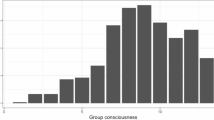Conclusion
I began this article with an effort to see how the concept of consciousness could be operationalized within an anthropological framework. It is clear from the examination of the concept that to use it to label or to judge is misleading. Instead, consciousness must be dialectical to be meaningful. Political, social or class consciousness emerges from a heritage of culture and a particular social context; it forms an understanding of society and so it shapes action. The presumption is that a particular action is reflective of some kind of an understanding, some kind of awareness. Further, the pattern of action is in turn a prime determinant of the consciousness of the actors.
Thus we can observe several different types of social situation from the point of view of determining whether politics is based on a consciousness of class: (1) where class is not a basis for action; (2) where class is a basis for action but the understanding of that situation by actors is in terms of another code, one furnished by religion or by a sense of corporatism, so that the class basis for action is disguised; (3) where class is the basis for social action, and is perceived as such. The difference between these last two cases is the gap that Marx referred to in his analysis of the fetishism of commidities, or that caused Lukacs to distinguish between consciousness and false consciousness. If the people act as though class were a consideration (whether or not they call it class) in situations which divide people along class lines, then a consciousness of class will probably emerge if it is not present already. Our interest here should not be in the individual but in the accepted definition of the situation, the code or the metaphor.
I have attempted to extrapolate from the actions of politics to some hypotheses about consciousness. My conclusion is that the evidence for “class consciousness” is more indirect than direct. In the case of the zerda, consciousness of class is not reinforced, though there are elements of class organization present. The election is similar to the zerda in that interpersonal rivalry is important, but different in that it is explicitly political, and the State appears on the scene. The reaction to the flood also highlights relations between Testouris and the State, but there is also a new element in the form of a fairly open confrontation between two classes. While it would be difficult to impute class consciousness except in the last case, the presence of class relations suggests that the Testouri model of society may soon develop such a perception.
One source of awareness of class is the relations of production within Testour's agrarian society. Many of the institutions of the town mask the full impact of these relations: the emphasis placed on interpersonal rivalry, the stress on genealogical and geographical origin, and the strong sense of being ‘from the town.’ Nevertheless, an awareness of class sometimes complements a behavior determined along class lines, as in the reaction to the flood. A second source of class consciousness would be the power relations that exist between the State, as the instrument of the dominant class at the national level, and the various segments of Tunisian society. People are conscious of these as political relations rather than the political expression of class relations, and so here, too, some aspects of the social relationship are not recognized.
The partially negative conclusion concerning class consciousness reflects the stage in the transition from precapitalist to capitalist society that Testour has reached. The complexity and subtlety of the real case should be a corrective to overhasty generalization as well as a contribution to the growing debate on the usefulness of consciousness as a concept in anthropology. As Lynch Footnote 1 argues, it is one way to restore the problematic of meaning to a mechanistic interpretation of a particular social situation. The idea of consciousness provides a sense of movement in change and creates the possibility of a dialectical understanding of political action.
Similar content being viewed by others
Notes
Lynch, op. cit., 1979; p. 18.
Additional information
Nicholas Hopkins is Chair of the Department of Anthropology, Sociology and Psychology at the American University in Cairo.
Rights and permissions
About this article
Cite this article
Hopkins, N.S. Class consciousness and political action in Testour. Dialect Anthropol 11, 73–91 (1986). https://doi.org/10.1007/BF00247883
Issue Date:
DOI: https://doi.org/10.1007/BF00247883




